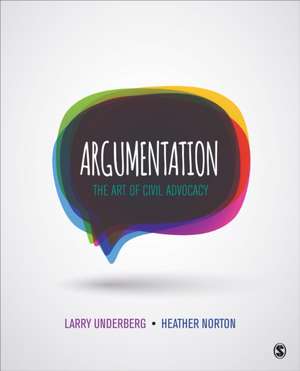Argumentation: The Art of Civil Advocacy
Autor Larry B. Underberg, Heather Nortonen Limba Engleză Paperback – 15 oct 2017
Preț: 724.42 lei
Preț vechi: 978.95 lei
-26% Nou
Puncte Express: 1087
Preț estimativ în valută:
138.63€ • 145.77$ • 114.54£
138.63€ • 145.77$ • 114.54£
Carte tipărită la comandă
Livrare economică 16-30 aprilie
Preluare comenzi: 021 569.72.76
Specificații
ISBN-13: 9781506345673
ISBN-10: 1506345670
Pagini: 200
Dimensiuni: 187 x 232 x 12 mm
Greutate: 0.34 kg
Ediția:1
Editura: SAGE Publications
Colecția Sage Publications, Inc
Locul publicării:Thousand Oaks, United States
ISBN-10: 1506345670
Pagini: 200
Dimensiuni: 187 x 232 x 12 mm
Greutate: 0.34 kg
Ediția:1
Editura: SAGE Publications
Colecția Sage Publications, Inc
Locul publicării:Thousand Oaks, United States
Cuprins
LIST OF TABLES
PREFACE
ACKNOWLEDGMENTS
SECTION I: THE NATURE AND CONTEXT OF ARGUMENT
CHAPTER 1 The Process of Argument
ARGUING IS PART OF OUR NATURE
WHAT IS ARGUMENT?
WHY SHOULD WE ARGUE?
ARGUING PRODUCTIVELY
WHEN NOT TO ARGUE
CONCLUSION
QUESTIONS FOR CONSIDERATION
KEY TERMS
CHAPTER 2 Credibility: The Foundation of Responsible Advocacy
TYPES OF CREDIBILITY
FACTORS AFFECTING AN ADVOCATE’S CREDIBILITY
THE ADVOCATE/LISTENER RELATIONSHIP
CONCLUSION
QUESTIONS FOR CONSIDERATION
KEY TERMS
CHAPTER 3 External Factors Influencing Argument
THE AUDIENCE
FIELD AND OCCASION
THE LARGER CONVERSATION
CONCLUSION
QUESTIONS FOR CONSIDERATION
KEY TERMS
CHAPTER 4 Audience-Based Argument
INTERACTING WITH FAMILIAR AUDIENCES
UNDERSTANDING UNFAMILIAR AUDIENCES
LIMITS OF DEMOGRAPHIC ANALYSIS
CONCLUSION
QUESTIONS FOR CONSIDERATION
KEY TERMS
SECTION II: IDENTIFYING AND MAKING QUALITY ARGUMENTS
CHAPTER 5 Discovering Arguments: Narrative Approaches
ARGUMENTS AS NARRATIVE
NARRATIVE ELEMENTS
EVALUATING NARRATIVES
CONCLUSION
QUESTIONS FOR CONSIDERATION
KEY TERMS
CHAPTER 6 Discovering Arguments: Stock Issue Approaches
QUESTIONS OF FACT
QUESTIONS OF VALUE
QUESTIONS OF POLICY
CONCLUSION
QUESTIONS FOR CONSIDERATION
KEY TERMS
CHAPTER 7 Supporting Arguments
WHEN DO I NEED TO USE OUTSIDE SUPPORT?
WHY DO I NEED TO USE OUTSIDE SUPPORT?
GENERAL EVALUATION OF OUTSIDE SUPPORT
CONCLUSION
QUESTIONS FOR CONSIDERATION
KEY TERMS
CHAPTER 8 Types and Tests of Evidence
EXAMPLES
STATISTICS
TESTIMONY
CONCLUSION
QUESTIONS FOR CONSIDERATION
KEY TERMS
SECTION III: EFFECTIVELY PRESENTING ARGUMENTS
CHAPTER 9 Language and Style in Argument
THE VARIETY OF PERSONAL STYLES
STYLE SHOULD REFLECT A CONSTRUCTIVE VIEW OF ARGUMENT
STYLE AND CREDIBILITY
LANGUAGE AS A COMPONENT OF STYLE
CONCLUSION
QUESTIONS FOR CONSIDERATION
KEY TERMS
CHAPTER 10 Responding to Arguments
LISTENING EFFECTIVELY
LISTENING FOR RELATIONSHIP AND CONTENT
PREPARING TO RESPOND
MAKING A RESPONSE
CONCLUSION
QUESTIONS FOR CONSIDERATION
KEY TERMS
ADDITIONAL RESOURCES
APPENDIX A: THE TOULMIN MODEL
APPENDIX B: LOGICAL FALLACIES
GLOSSARY
NOTES
INDEX
ABOUT THE AUTHORS
PREFACE
ACKNOWLEDGMENTS
SECTION I: THE NATURE AND CONTEXT OF ARGUMENT
CHAPTER 1 The Process of Argument
ARGUING IS PART OF OUR NATURE
WHAT IS ARGUMENT?
WHY SHOULD WE ARGUE?
ARGUING PRODUCTIVELY
WHEN NOT TO ARGUE
CONCLUSION
QUESTIONS FOR CONSIDERATION
KEY TERMS
CHAPTER 2 Credibility: The Foundation of Responsible Advocacy
TYPES OF CREDIBILITY
FACTORS AFFECTING AN ADVOCATE’S CREDIBILITY
THE ADVOCATE/LISTENER RELATIONSHIP
CONCLUSION
QUESTIONS FOR CONSIDERATION
KEY TERMS
CHAPTER 3 External Factors Influencing Argument
THE AUDIENCE
FIELD AND OCCASION
THE LARGER CONVERSATION
CONCLUSION
QUESTIONS FOR CONSIDERATION
KEY TERMS
CHAPTER 4 Audience-Based Argument
INTERACTING WITH FAMILIAR AUDIENCES
UNDERSTANDING UNFAMILIAR AUDIENCES
LIMITS OF DEMOGRAPHIC ANALYSIS
CONCLUSION
QUESTIONS FOR CONSIDERATION
KEY TERMS
SECTION II: IDENTIFYING AND MAKING QUALITY ARGUMENTS
CHAPTER 5 Discovering Arguments: Narrative Approaches
ARGUMENTS AS NARRATIVE
NARRATIVE ELEMENTS
EVALUATING NARRATIVES
CONCLUSION
QUESTIONS FOR CONSIDERATION
KEY TERMS
CHAPTER 6 Discovering Arguments: Stock Issue Approaches
QUESTIONS OF FACT
QUESTIONS OF VALUE
QUESTIONS OF POLICY
CONCLUSION
QUESTIONS FOR CONSIDERATION
KEY TERMS
CHAPTER 7 Supporting Arguments
WHEN DO I NEED TO USE OUTSIDE SUPPORT?
WHY DO I NEED TO USE OUTSIDE SUPPORT?
GENERAL EVALUATION OF OUTSIDE SUPPORT
CONCLUSION
QUESTIONS FOR CONSIDERATION
KEY TERMS
CHAPTER 8 Types and Tests of Evidence
EXAMPLES
STATISTICS
TESTIMONY
CONCLUSION
QUESTIONS FOR CONSIDERATION
KEY TERMS
SECTION III: EFFECTIVELY PRESENTING ARGUMENTS
CHAPTER 9 Language and Style in Argument
THE VARIETY OF PERSONAL STYLES
STYLE SHOULD REFLECT A CONSTRUCTIVE VIEW OF ARGUMENT
STYLE AND CREDIBILITY
LANGUAGE AS A COMPONENT OF STYLE
CONCLUSION
QUESTIONS FOR CONSIDERATION
KEY TERMS
CHAPTER 10 Responding to Arguments
LISTENING EFFECTIVELY
LISTENING FOR RELATIONSHIP AND CONTENT
PREPARING TO RESPOND
MAKING A RESPONSE
CONCLUSION
QUESTIONS FOR CONSIDERATION
KEY TERMS
ADDITIONAL RESOURCES
APPENDIX A: THE TOULMIN MODEL
APPENDIX B: LOGICAL FALLACIES
GLOSSARY
NOTES
INDEX
ABOUT THE AUTHORS
Notă biografică
Larry Underberg is a professor of Communication Studies at Southeast Missouri State University. He received his B.A. from Northern Illinois University, M.A. from Auburn University, and Ph.D. from Penn State University; all in Rhetoric and Public Address. He has taught Argumentation and Debate for nearly forty years receiving the ¿Lifetime Achievement Award¿ from the National Educational Debate Association and the ¿Outstanding Contribution to Argumentation¿ award from the Central States Communication Association Argumentation and Forensics Division. In addition to Argumentation, he teaches Political Communication, Persuasion and Social Movements, Rock `n Roll and Rebellion and Nonverbal Communication.
Descriere
Argumentation: The Art of Civil Advocacy teaches students the principles of argumentation as a practical way to engage in interpersonal and public deliberation. Authors Larry Underberg and Heather Norton offer a unique approach for creating civil discourse by encouraging students to consider how they argue with others to enhance or diminish opportunities for future dialogue. A variety of everyday examples are provided in the text to demonstrate how well-reasoned argumentation can strengthen communities and create productive citizenship. Students gain a better understanding for the situations, environments, and relationships that form the context for an advocate, and how those factors can influence discourse.
